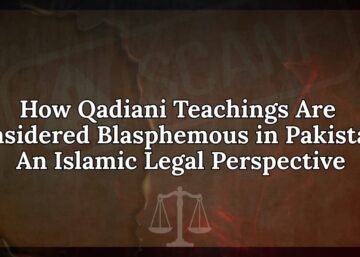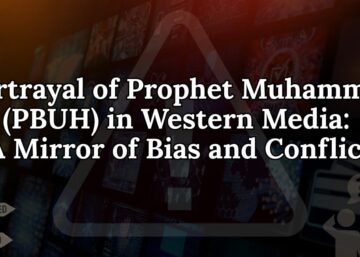Introduction
Pakistan, established as an Islamic republic in 1947, is unique in that its constitutional and legal framework is heavily influenced by the principles of Islam. One critical area in which it most visibly manifests itself is in the laws of prophethood, particularly in relation to issues of the finality of prophethood and its implications for the state and its citizens. Pakistan’s legal structure governing the doctrine of the finality of prophethood, like the Second Amendment and all connected legislations, appears to be rooted in the presumption that Ahmadis’ beliefs violate the basic principles of Islam. These laws, precisely targeting the Ahmadiyya community, specifies that the state considers certain views held by this community as potentially dangerous or deceptive for mainstream Muslim beliefs. This article provides a scholarly analysis towards the concept of prophethood and its integration into the constitutional laws of Pakistan.
Contradiction of Core Islamic Beliefs
Many of the Islamic scholars and legal authorities in Pakistan argue that the spread of Ahmadi beliefs is not just a theological deviation but an attempt to preach a wrong doctrine intentionally. The claim of the community that Mirza Ghulam Ahmad was a prophet after Prophet Muhammad (PBUH) brings the verdict as directly against the Khatm-e-Nabuwwat, the Islamic doctrine of finality of prophethood. This doctrine is fundamental to mainstream Islamic thought, and any deviance from it is deliberated heretical. By claiming prophethood, Ahmadis are seen as stimulating a central religious tenet, which Muslim ummah believe in, it destabilizes the harmony of the Muslim ummah (community).
Undermining Islamic Identity
In Pakistan, Islam does play a very influential role in defining the identity of the nation. Legal classification of the Ahmadiyya as non-Muslims makes it clear that the state fears confusions between Ahmadiyya beliefs and mainstream Islamic ones, since Ahmadis consider themselves Muslims despite holding beliefs contrary to the nature of Islamic consensus. The laws may thus be seen to constitute a fortification against what is perceived as an effort by the Ahmadiyya community to weaken or destabilize the distinct Islamic identity, mainly by endorsing an alternative understanding of prophethood that is prohibited by mainstream Muslims.
The Ahmadis use conventional Islamic greetings, calling their houses of worship mosques, or their religious leaders Imams to lend an impression that Ahmadis are part and parcel of the Muslim faith. This has largely resulted in views that this action weakens the religious integrity of the Islamic community by establishing an alternative religious ideology under the guise of being a variation of Islam, this will create confusion among uninformed individuals.
The Constitutional Position of Pakistan on Prophethood
Pakistan, as an Islamic republic, integrates the code of the finality of prophethood into its constitution. This is apparent in several sections and amendments, particularly the Second Amendment (1974) and the inclusion of Article 260(3).
Second Amendment (1974)
One of the landmark legal developments concerning the finality of prophethood in Pakistan was the Second Amendment to the Constitution, adopted on 7 September 1974. The amendment declared the Ahmadiyya community as non-Muslims, mainly because of their beliefs on the question of prophethood. The Ahmadiyya community, also known as Qadianis, believe in Mirza Ghulam Ahmad as a prophet; this belief is a negation of the concept of the finality of prophethood, as propounded by traditional Islamic thought.
The Second Amendment added the following definition to the Constitution:
“A person who does not believe in the absolute and unqualified finality of the Prophethood of Muhammad (peace be upon him), the last of the Prophets, or claims to be a prophet in any sense of the word or of any description whatsoever, after Muhammad (peace be upon him), or recognizes such a claimant as a prophet or a religious reformer, is not a Muslim for the purposes of the Constitution or law.“
This amendment institutionalized the Islamic belief about the finality of prophethood (PBUH) into the legal fabric of Pakistan, which in effect distinguished the Muslims from the non-Muslims on the basis of this theological principle.
Article 260(C)
Article 260(C) of the Constitution of Pakistan further clarifies the position of the state regarding the identification of individuals or groups who are considered Muslims under the law. It defines a Muslim as one who believes in the finality of the prophethood of Muhammad (PBUH), explicitly excluding those who do not adhere to this belief.
Article 260(C) of the Constitution of Pakistan goes further in explaining who are those individuals or groups classified by law as Muslims. It identifies, A Muslim is one who believes in the finality of the Prophethood of Muhammad (PBUH), a position, which implicitly excludes others who do not believe in it.
Blasphemy Laws and Prophethood
In addition to the Second Amendment, Pakistan’s blasphemy laws are another area where the notion of prophethood plays a noteworthy role. The law states that it is considered an offense to revile or utter irreverent words about Prophet Muhammad (PBUH). Section 295-C of the Pakistan Penal Code, introduced in 1986, makes the death penalty or life imprisonment mandatory against any person who commits blasphemy against Prophet Muhammad (PBUH), by defiling or uttering anything against him. This law is part of a broader legal structure of Pakistan, with the intention of preservating the sanctity of Islam and its subsequent connotation, the finality of the Prophet Muhammad’s role.
Conclusion
The constitutional and legal step Pakistan has taken against the Ahmadiyya community has also underlined its standpoint of claiming that the Ahmadiyya belief system forms an intentional challenge to principal Islamic tenets. The insight that the Ahmadiyya community intentionally seeks to mislead Muslims, propagate heretical beliefs, and undermine the Islamic identity of the country is a driving factor behind these laws. From the state’s perspective, these legal restrictions are implemented to preserve the sanctity of Islam and thereby ensure the religious and social cohesion of the nation.



